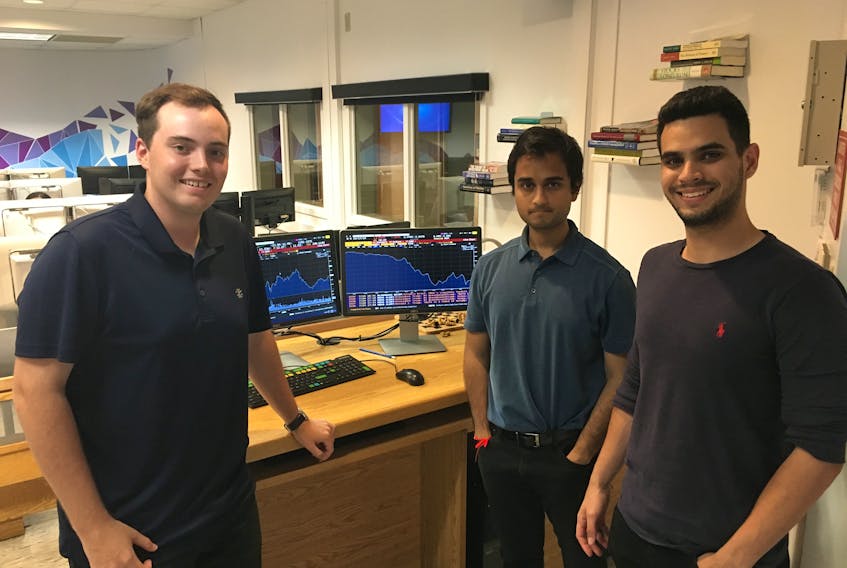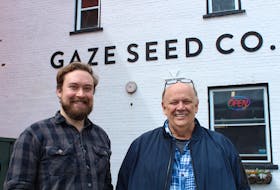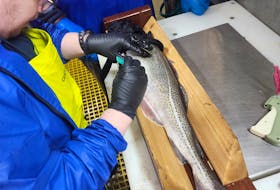I’ve always been a fan of hands-on learning.
I can study something, plan it, research it and conceptualize until the cows come home and probably muddle through. But actually getting my hands dirty and doing something for real? Well, that makes the knowledge stick.

And it’s an approach that can be applied in just about any context.
Think of it as an extension of the wise words of Miss Frizzle on “The Magic Schoolbus” — “Take chances, make mistakes, get messy.”
But hands-on can be a bit tricky when you’re studying global investment markets, investing real dollars. The stakes are much higher.
But that’s exactly what’s happening at Memorial University’s school of business through MUN’s student-managed investment fund.
The fund is recruiting for a team to manage the fund for 2019-2020.
“The fund manages a portfolio of over $150,000, investing in global equity and bond markets. Any Memorial student with a keen interest in finance and economics can apply now. Recruitment closes Aug. 23,” a recent news release stated.
I was intrigued, so I got in touch with Erin Oldford, the assistant professor who heads up this particular course.
Last year was its first full year, with a student-led team working with Oldford and a group of mentors from the business community.
Investment funds managed by students using real money are not new. The idea’s been around for more than 50 years and has really grown at North American universities over the last two decades.
But until two years ago, MUN didn’t have one.
That’s when Oldford joined the business faculty, coming from Carleton University, where there was already a student-managed investment fund.
“The idea was sort of in the works even before I joined MUN two years ago. There were some students who wanted to do but there wasn’t really a champion for it. So, I think a week into my time here I was like, ‘Yeah, let’s do this,’” Oldford said.
The ducks fell into a row. There was student interest. There was support from the new dean at the school of business, Isabelle Dostaler.
Most importantly, there was donor support.
Luke O’Brien, (B.Comm Co-op 1997) vice-president, portfolio manager and wealth advisor at RBC Dominion Securities Inc., came forward with $50,000 to help get the fund started. Brad White (B.Comm 1991) co-founder, partner and chair of Edgehill Partners in Toronto, came up with a $100,000 donation, giving the new fund its $150,000 in capital to begin investing. (White was also the donor who helped established the White Business Lab at the faculty from which the fund operates.)
The idea behind the program is simple: real experience in the markets from within a safe, educational setting.
“The point is to get their hands dirty,” Oldford said. “We call it experiential learning, so instead of sitting in a classroom where I’m up there drawing out models, this kind of flips it and says, ‘You guys go learn. Let me provide the framework to support your learning but you guys are going to get uncomfortable’ — and they do. ‘You guys are going to have to make some mistakes, you’re going to have some successes.’”
Last year the fund was offered as more of an extracurricular program. This year it’s being offered as a formal course — Applied Equity Valuation — in the fall semester, and students will earn a semester’s credit even though the program lasts a full year. Oldford is onboard as the instructor.
“We’re trying to mimic a fund that would exist on Bay Street or Wall Street. We set it up so that we have a portfolio manager who monitors and leads the team but then we have a lot of worker bees searching the market for opportunities that fit our mandate,” Oldford said.
“Part of the design of the fund is that we have an investment mandate. It’s a value-oriented mandate so we’re trying to find stocks that are underpriced, that have big appreciation prospects in the long run. The students are searching for those and if they find one they like and it’s supported by their managers, then they start researching.”
Equity research is the main focus. Students produce a report which is shared among the team and then have to pitch it and defend it to their 16 industry mentors. And the mentors pull no punches giving feedback on whether the stock is worth investing in.
Last year, 15 stocks were pitched and approved and invested in, creating a fairly diverse portfolio.
“We have utilities, we have consumer staples, real estate companies, the Toronto Stock Exchange itself, we have tech companies like Oracle, we have a Finnish pulp and paper company called Stora Enzo,” said fifth-year B.Comm student Scott Vatcher.
One of the team members last year, he’s returned as portfolio manager.
For him, the experience the fund offers is critical if he wants to make a career in the investment banking sector.
“It’s a very competitive job space in this industry. So, by doing this and getting this real-world experience in school, it just positions you so much better to be able to go into those interviews on Bay Street or Wall Street and be able to have some real-life experience,” Vatcher said. “Without that experience you’re just talking about stuff you learned in text books or trading on your own or talking to your buddies.”
In fact, these days most companies in the investment sector expect job applicants to have this kind of real-world experience.
“When they’re looking to hire people for entry-level positions, they first screen for student-management investment fund experience, and if you don’t have it, you’ll be triaged out of the pile,” Oldford said. “I don’t look at this as a bonus to their education, I think it’s an essential component. Our primary goal is not (just) to make money. That’s our secondary goal, our primary goal is learning.”
That’s the value of having real money on the line, Vatcher added.
“Everybody in the fund has done these trading competitions and stuff like that and they’re great exercises but this is a whole different thing,” he said. “Coming from doing trading competitions it’s moving over to ‘Wait, we’re actually going to buy this? Would you really buy this?’ It really makes you double check your thoughts.”
So far the fund has seen a positive return on investment. And while education is the fund’s primary mandate, a little profit won’t hurt.
“All of the fund’s capital comes from donations. If the fund makes a profit it will go back directly into the program,” Oldford said.
If you’re a MUN student and this interests you, you have until Aug. 23 to apply.
It’s open to all MUN students, not just business students.
Just be prepared to work hard, take some risks and get a little messy.
Mark Vaughan-Jackson is The Telegram’s business and op-ed editor. He can be reached at [email protected]
RELATED:









